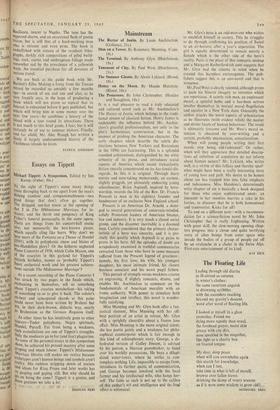Essays on Tippett
Michael Tippett: A Symposium. Edited by Ian Kemp. (Faber, 50s.) AT the sight of Tippett's name many things come thronging back to me apart from the man's shining candour and companionableness—two good things that don't often go together. The drugged, sun-hot music at the opening of Act 3 in The Midsummer Marriage, for in- stance; and the throb and pungency of King isher's funeral passacaglia in the same opera. There are things from his concert-hall music also, not necessarily the best-known pieces, Which equally cling like burrs. Why don't we hear more of the Fantasia on a Theme of Handel (1941), with its polyphonic sinew and blazes of r120-Handelian glory? Or the hitherto neglected Piano Concerto of 1956, which Colin Mason, one of the essayists in this garland for Tippett's sixtieth birthday, names as 'probably Tippett's finest orchestral work and his greatest achieve- ment outside The Midsummer Marriage'?
At a recent recording of the Piano Concerto I Was struck by two pages in the finale which, enchanting in themselves, tell us something about Tippett's creative metabolism—his taking of something so as to give it back. The soloist's Ml-beat and syncopated chords at this point could never have been written by Brahms but are, in their dark-brown, didactic way, nearly as Brahmsian as the German Requiem itself.
At other times he has intuitively gone to other sources—Tudor polyphony, Negro spirituals, Mandel, Purcell. Far from being a weakness, such assimilations are one of Tippett's strengths. (391Y the mediocre go in for (and fear) plagiarism. As some of the personal essays in this symposium show, he achieved his present mastery after some groping and much labour. Tippett's Midsununer 'Wordage libretto still makes me restive because archetypes aren't human beings and symbols aren't reality. His ruthless stripping down of texture and idiom for King Priam and later works has
gasping and gaping still. But why should he rum geniuses we take a lot. rum geniuses we take a lot.
4ir; .4'
CHARLES REID


































 Previous page
Previous page